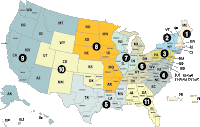In Cevallos v. Rideout (4D08-3042), the Fourth District considered whether the rebuttable presumption of rear-driver negligence" applies "to bar a claim by a rear-driver plaintiff because a lead-driver defendant could be comparatively negligent." The court stated:
“In Florida, there is a rebuttable presumption that the negligence of the rear driver in a rear-end collision was the sole proximate cause of the accident.”...A rear-driver defendant can overcome the presumption by establishing that the lead-driver plaintiff stopped abruptly a n d arbitrarily. Once the rear-driver defendant overcomes the presumption, the burden of proof on the proximate cause of the collision reverts back to the plaintiff, who can no longer rely on the presumption to establish the sole proximate cause of the accident...
Where the plaintiff is the rear driver, however, the rear-driver plaintiff, like the rear-driver defendant, must prove that the lead-driver stopped abruptly and arbitrarily to rebut the presumption that the plaintiff’s own negligence was the sole proximate cause of the accident. Phrased another way, the evidence must establish that the rear-driver plaintiff cannot reasonably have been expected to anticipate the lead driver’s sudden stop.
***
The distinction between a presumption of comparative negligence and a presumption of the sole cause of the accident is reasonably related to the purpose of the presumption. Not only does the “sole cause of the accident” presumption relieve the lead-driver plaintiff of the difficult task of adducing “proof of all four elements of negligence,” it serves the additional public policy of ensuring that all drivers “push ahead of themselves an imaginary clear stopping distance or assured stopping space or adequate zone within which the driven vehicle can come to a stop.”
***
The plaintiff has the burden to prove duty, breach of the standard of care, proximate cause, and damages. In this case, the plaintiff simply could not rebut the presumption that her own negligence was the sole legal cause of the collision. Accordingly, the trial court correctly directed a verdict for the defendant.



0 comments:
Post a Comment